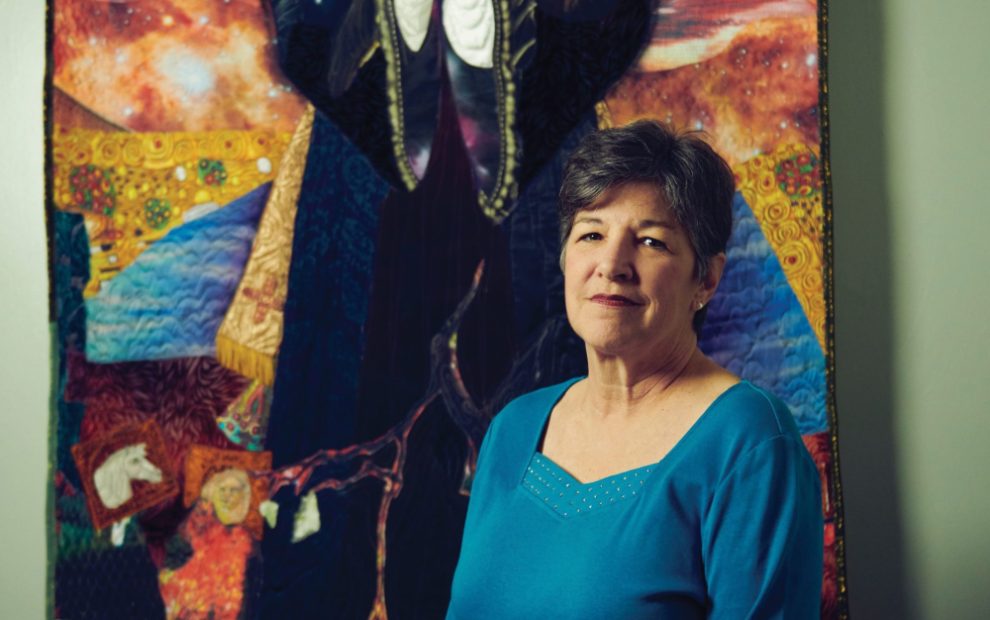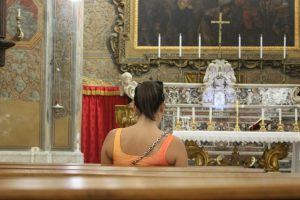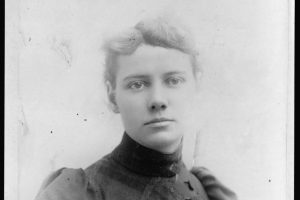“I just wanted someone to listen,” said the shirtless man propped on pillows in a hospital bed, his voice cracking and eyes welling as an oxygen tank hissed and clicked at regular intervals to aid his labored breathing. A woman volunteer spooned red Jell-O and a pill into his mouth, waiting patiently as he swallowed before preparing another dose.
The patient, called a resident by his caregivers, had bounced from one health care facility to another before finding a home at Hildegard House in Louisville, Kentucky. Although he was once a local hospital medical director and psychiatrist, Tony Siegel said he fell through a hole in this country’s end-of-life health care safety net. Hospitals, designed for only short-term, acute care, were not an option after his diagnosis of metastatic cancer. Due to divorce he didn’t have family to care for him at home or the financial resources to hire 24/7 care, a necessary condition for most hospice programs.
Fortunately for Siegel, one of his high school classmates now sat in a chair at his bedside, listening. Karen Cassidy, a former palliative care nurse, founded in 2016 the only “comfort care” home in Kentucky and one of only 100 in the United States, according to Omega Home Network, a membership organization of community homes for the dying. As soon as the doctor moved into one of three bedrooms in Cassidy’s repurposed Ursuline convent, he said he was respected—and heard—by staff and volunteers, who he called “angels on my shoulders.” Cassidy adds: “ ‘Listening with the ear of our heart’ is what we do here.”
The 67-year-old woman’s call to listen to the poor and abandoned, as well as to accompany them in the dying process, began during her professional career, but it found its fruition in her faith. Cassidy says she made three pilgrimages to Germany to retrace the footsteps of 12th-century Benedictine abbess St. Hildegard of Bingen. There, she visited the saint’s monastery and saw firsthand how this doctor of the church and herbalist ministered to the sisters of her abbey until their natural deaths. “So really,” Cassidy notes, “she started one of the first hospices.”
Cassidy says she became a Benedictine oblate to follow the example of St. Hildegard. “I want to be a ‘feather on the breath of God,’ ” she explains. “To me that means God blows you to be the very best you can be. When your ego gets in the way, then the feather can’t float.”
When she was blown in the direction of opening her own care home, it came with many challenges. But, she says, her patron saint always interceded and provided solutions: “I call those moments ‘Hildegard winks.’ ”
The first wink came in 2014 when Cassidy learned her diocese had a vacant convent available for rent. Another came when a construction contractor who recently lost a loved one to cancer arrived on her doorstep and offered to do much of the renovation work pro bono. That is why the remarkable mystic, musician, theologian, and medical practitioner is “kind of a godmother around here,” Cassidy explains.
As a lay member of a Benedictine monastery in Indiana, Cassidy follows the same rule of life as her patroness, the Rule of St. Benedict. She points out that the first word in the Rule is “listen,” which became the core philosophy of Hildegard House: “Here we say, ‘I’ll listen to you. And when you can’t talk anymore, I’ll just sit with you. And when you don’t want anybody, I will let you be by yourself.’ ”
Images of St. Hildegard preside everywhere in the 1920s-era brick building that once housed 10 sisters teaching at a parochial school in the Butchertown neighborhood. A portrait featuring dazzling eyes surrounded by a black habit greets visitors in the wood-paneled foyer. A saintly sculpture, carved by a local artist from a former maple tree in the backyard garden, reaches heavenward. In all depictions St. Hildegard holds a feather, recalling an allegory she wrote about staying open to God’s grace: “The feather flew, not because of anything in itself, but because the air bore it along. Thus I am a feather on the breath of God.”
Since founding Hildegard House, Cassidy has shared God’s grace with some 150 souls who found final earthly rest in a homelike atmosphere, even if for only a few weeks. Based on referrals from public safety and protective services personnel, she meets potential residents who are homeless or in dire, unsafe conditions, seeing firsthand what happens when well-intentioned family members are ill-equipped to provide adequate end-of-life care between visits by hospice workers. For years the former public health nursing professor says she taught students how the health care system and hospice are not only flawed but also rife with fraud. She says that is one reason reliable statistics characterizing the scope of this problem in Louisville and across the country are hard to come by.
“I’ve got a stack of probably about 20 folders on my desk of people we haven’t been able to serve because they’ve died before we were able to get to them,” Cassidy explains. So she recently purchased a home across the street, which will be renovated to provide an additional three resident rooms, the total limited by licensing restrictions.
Only after registering a permanent address at Hildegard House and receiving care not covered by hospice—bathing, toileting, food preparation and feeding, housekeeping, and laundry—do residents qualify for visits by nurses and the pain medications they provide. Teams of five volunteers per resident take care of those physical needs 24/7, but they also do so much more. Cassidy and her staff allow the terminally ill to make all decisions about how to spend their last days, be it indulging in unlimited glasses of orange soda, taking medications, reconciling with estranged family members, or none of the above. “A lot of people who come here have never experienced that kind of love,” she explains. “Unconditional love.”
That is why Cassidy calls the home’s volunteers not “caregivers” but “compassionate companions.” One companion takes loving portrait photos of each resident to be used in obituaries. Others contact family members and arrange for memorial services. And when the end comes, each resident’s name is inscribed on a wooden heart and tied to a memorial wreath displayed on the staircase to the second floor. “We’re serving each other,” Cassidy explains.
Cassidy serves with overstuffed chairs in the living room and comfort food on the menu. At Hildegard House there is little evidence of anything “medical,” with the possible exception of clipped, staccato questions a visiting hospice nurse asks, apparently in a hurry to finish her weekly rounds. But once she finishes and departs, authentic communication returns in hushed tones and quiet laughter, punctuated by dings and buzzes of a game show emanating from a resident’s television. As Judy Noble, a longtime volunteer and house manager, unloads groceries in the kitchen, she notes how working with Cassidy has offered as many lessons about living as it has dying. “Death is not scary,” she says. “There is nothing to fear.”
That is a message Cassidy hopes is heard beyond the walls of Hildegard House. Her larger mission, she says, is to create an ever widening community of compassion that recognizes human dignity at all stages of life. Just as a gentle wind might bear a feather aloft for miles, she hopes her unconditional love of the forgotten and dying will lift even the living toward heaven.
“When volunteers tell others where they work, very often those strangers want to tell about a death they’ve experienced,” Cassidy says. “Compassionate companions are willing to listen to them. Listening helps people heal.”
This article also appears in the February 2023 issue of U.S. Catholic (Vol. 88, No. 2, pages 45-46). Click here to subscribe to the magazine.
Image: Courtesy of Karen Cassidy














Add comment